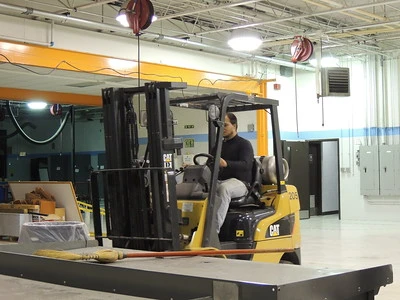Is Online Forklift Certification Legit? (Let OSHA Answers This)
January 23, 2024 | by Mike Pattenson


Online forklift certification courses are legitimate in the sense that they satisfy the classroom training requirement set by OSHA. However, according to OSHA’s standard 29 CFR 1910.178, forklift training must include a combination of formal instruction (which can be completed online), practical training, and evaluation of the operator’s performance in the workplace. This means that while online courses can provide the necessary theoretical knowledge, they cannot fulfill the practical training and evaluation components required for complete certification.
The practical training and evaluation must be conducted under the direct supervision of someone with the knowledge, training, and experience to train operators and evaluate their competence, which cannot be achieved through online training alone. Employers are responsible for ensuring that operators receive both practical training and a performance evaluation in the workplace, using the actual equipment they will be operating.
For individuals looking to become certified forklift operators, online training can be a convenient and cost-effective way to complete the formal instruction component. Many online courses are available that cover essential topics such as forklift operation safety, OSHA rules, and forklift maintenance, and can be completed in as little as one hour. However, to meet OSHA’s certification requirements fully, individuals must also undergo practical training and an evaluation, which typically needs to be arranged by their employer.
Employers have the option to use online training for the formal instruction part of their forklift training programs, but they must provide practical training and evaluation in-house or through a qualified third party. This ensures that forklift operators are competent and can operate forklifts safely in their specific work environments.
Read related article: Does OSHA Recognize Online Forklift Training?
Here’s What OSHA Said
Question 1. What is OSHA’s position on computer-based training programs for cognitive training?
Answer: In OSHA’s view, self-paced, interactive computer-based training can serve as a valuable training tool in the context of an overall training program. However, use of computer-based training by itself would not be sufficient to meet the intent of most of OSHA’s training requirements, in particular those of HAZWOPER. Our position on this matter is essentially the same as our policy on the use of training videos, since the two approaches have similar shortcomings. OSHA urges employers to be wary of relying solely on generic, “packaged” training programs in meeting their training requirements. For example, training under HAZWOPER includes site-specific elements and should also, to some degree, be tailored to workers’ assigned duties.
Answer to letter of J. H. Ward, November 22, 1994
Let’s Evaluate If It Is The Real Deal
When you’re looking at online forklift certification, you want to make sure it’s the real deal. Here’s what to check for:
- Is it Recognized by the Right People?
- Accreditation and Standards Compliance: This means the online forklift certification course should be officially recognized by relevant authorities. In the U.S., for example, OSHA (Occupational Safety and Health Administration) sets safety training standards. If the course meets these standards, it’s a sign that it’s legitimate and follows the rules and guidelines necessary for forklift operation safety. It’s like getting a stamp of approval from the experts who know what’s needed for safe forklift use.
- Does it Teach Everything You Need?
- Comprehensive Training Coverage: A good online forklift course should teach you everything from the basics to the more complex aspects of operating a forklift. This includes how to handle the forklift, understanding different models, safety procedures, how to load and unload, maneuvering, and even emergency protocols. Think of it like a full course meal – you want all parts, from appetizer to dessert, to ensure you’re fully prepared.
- Getting Your Hands Dirty
- Incorporation of Hands-On Training Components: Forklift operation is very practical. It’s not enough to just read about it or watch videos; you need to actually practice using a forklift. The best courses usually have a practical component where you can physically operate a forklift, ideally under the guidance of a skilled instructor. This is like learning to swim – you can’t really learn it just by reading a book; you have to get in the water.
- The Downside of Online-Only
- Challenges and Limitations of Online-Only Training: While learning online is convenient, there are limitations, especially for something hands-on like forklift training. For instance, online courses might not provide enough practical experience, and it’s hard to get immediate feedback or correction like you would in person. Also, certain nuances and real-life challenges of operating a forklift might not be fully captured in an online setting. It’s like trying to learn to drive a car just by playing a video game – you get the idea, but it’s not quite the same as real driving.
Read related article: How to Fail a Forklift Test? (7 Ways to Fall Short)
Pros and Cons of Online Forklift Certification
Its Pros
1. Convenience and Accessibility
Online forklift training programs offer the utmost convenience. You can access the course material from anywhere at any time, eliminating the need for physical attendance in a classroom setting. This flexibility makes it ideal for individuals with busy schedules or those who cannot easily access training facilities.
2. Self-Paced Learning
With online training, learners can proceed at their own pace, revisiting complex topics or skipping sections they’re already familiar with. This self-paced nature caters to different learning speeds and styles, ensuring that all participants fully understand the course material before moving forward.
3. Cost-Effectiveness
Generally, online courses tend to be less expensive than their in-person counterparts. The reduction in costs related to travel, physical materials, and venue hire is often passed on to the learners, making online forklift certification a budget-friendly option.
4. Wide Range of Resources
Online training programs often provide a variety of learning materials, including videos, interactive simulations, and downloadable content. This range can enhance understanding and retention of information, catering to different learning preferences.
5. Immediate Certification
Upon completing an online course and passing the required tests, participants can often print their certification immediately. This instant gratification and proof of completion can be advantageous for job seekers needing to demonstrate their qualifications quickly.
Its Cons
1. Lack of Hands-on Training
The most significant limitation of online forklift training is the absence of practical, hands-on experience. Operating a forklift safely requires physical practice, which cannot be fully simulated or replicated online. To become competent, operators need actual driving experience under the supervision of a qualified trainer.
2. Limited Instructor Interaction
Online courses often provide limited direct interaction with instructors. This can make it challenging to get immediate answers to questions or personalized feedback on progress. Some learners may find this lack of interaction hinders their learning experience.
3. Self-Discipline Requirements
The self-paced nature of online learning requires a high degree of self-discipline and motivation. Learners must manage their time effectively and commit to completing the course without the structure provided by traditional classroom settings.
4. Technology Dependence
Online training relies heavily on technology, meaning participants need a reliable internet connection and suitable devices. Technical issues can hinder progress and disrupt the learning experience.
5. Verification of Skills
While online courses can certify theoretical knowledge, verifying practical skills acquired without direct observation is challenging. Employers may require additional evidence of hands-on competency, necessitating further evaluation or training.
While online forklift certification offers numerous benefits in terms of convenience, cost, and accessibility, it also has limitations, particularly in providing practical experience and direct instructor feedback. Prospective learners should weigh these factors carefully against their learning preferences and career goals.
While the Online Training Is Legit, You Still Need to take the Hands On To be Fully Certified
While online training for forklift certification is legitimate and provides a solid foundation in theoretical knowledge, hands-on training is essential to become fully certified and competent in forklift operation. This two-part approach is important for several reasons:
- Practical Skills: Operating a forklift involves practical skills that can only be fully acquired through hands-on experience. Maneuvering a forklift, understanding its balance and load dynamics, and reacting to real-world scenarios in a safe manner are aspects that cannot be fully grasped through online learning alone.
- Safety: Forklift operation is inherently risky, and safety is a paramount concern. Hands-on training allows operators to practice in a controlled environment under the supervision of an experienced trainer. This training is crucial for learning how to operate a forklift safely and effectively, thereby reducing the risk of accidents and injuries.
- Certification Requirements: Many certification bodies and employers require proof of practical training as part of the certification process. This is to ensure that forklift operators have not only the theoretical knowledge but also the practical skills necessary for safe operation.
- Employer Confidence: Employers are more likely to have confidence in the capabilities of an operator who has completed both online and hands-on training. This comprehensive approach assures them that the operator is well-prepared for the challenges of operating a forklift in a real-world environment.
While online training is a valuable and legitimate component of forklift certification, completing hands-on training is essential to be fully certified and prepared for the safe and effective operation of a forklift.
To Make a Conclusion
Online forklift certification can indeed be legitimate and valuable, provided it meets the necessary standards set by regulatory bodies like OSHA.
While online courses offer the theoretical knowledge required for safe forklift operation, they must be complemented with practical, hands-on training and evaluation to ensure comprehensive skill development.
The convenience, flexibility, and cost-effectiveness of online certification make it an attractive option for many, but the ultimate legitimacy and acceptance of such certification depend on adherence to regulatory requirements and recognition by employers.
As such, when pursuing online forklift certification, it’s important to choose programs that offer a balanced approach to learning, combining both online instruction with the necessary practical experience.
RELATED POSTS
View all



